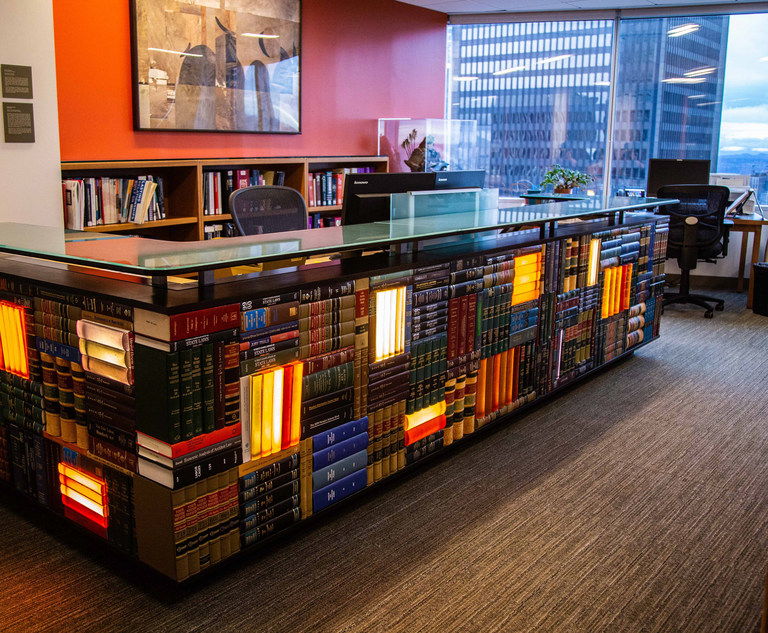Time for Legal To 'Change Its Vocabulary'?: These Law Firms Are Leaving the Concept of Losing a Desk at the Door
"Everybody tends to think of hoteling as giving up something. But in fact, it is the opposite if you get the space right. It gives you the flexibility to use the space for whatever you need," said Perkins Coie's Tammy Baldwin.
April 06, 2022 at 04:12 PM
7 minute read
What You Need to Know
- Law firms are breaking away from the negative connotation of hoteling, or giving up a desk.
- Attorneys are opting into hoteling arrangements in major cities like Austin and Silicon Valley.
- Perkins Coie and Wilson Sonsini adopted software to streamline team-based workspaces.
 Perkins Coie Seattle office. Courtesy photo[/caption] Big Law firms are beginning to overcome hurdles to shared-space working arrangements, putting their visions for the office of the future into action. The concept of hoteling isn't new to the professional services industry. In fact, Big Four consultancies have been using the concept successfully for at least a decade. Yet, law firms have struggled to make the shift from "the negative connotation of 'losing my desk' to the positive connotation of 'having a hotel-like experience,'" Anthony Davies, chief revenue officer for onsite outsourcing Forrest Solutions, wrote for Law.com in August. Tammy Baldwin, chief of business operations at Perkins Coie, agreed that the legal industry has historically rejected office-sharing, regardless of the many forms that it comes in. "Everybody tends to think of hoteling as giving up something. But in fact, it is the opposite if you get the space right. It gives you the flexibility to use the space for whatever you need. ... Sometimes you just need a space to make a call. Sometimes you need a conference room," she said. Baldwin suggested that "the industry needs to change its vocabulary." She said Perkins Coie refers to its office planning as "workplace solutions," suggesting that office-sharing and hoteling are not one-size-fits-all solutions. "We've adopted a very flexible model by design, which allows us to manage our real estate so we're not warehousing space," Baldwin said, noting the firm has been able to reduce its space by 30% on average as each office lease comes up.
Perkins Coie Seattle office. Courtesy photo[/caption] Big Law firms are beginning to overcome hurdles to shared-space working arrangements, putting their visions for the office of the future into action. The concept of hoteling isn't new to the professional services industry. In fact, Big Four consultancies have been using the concept successfully for at least a decade. Yet, law firms have struggled to make the shift from "the negative connotation of 'losing my desk' to the positive connotation of 'having a hotel-like experience,'" Anthony Davies, chief revenue officer for onsite outsourcing Forrest Solutions, wrote for Law.com in August. Tammy Baldwin, chief of business operations at Perkins Coie, agreed that the legal industry has historically rejected office-sharing, regardless of the many forms that it comes in. "Everybody tends to think of hoteling as giving up something. But in fact, it is the opposite if you get the space right. It gives you the flexibility to use the space for whatever you need. ... Sometimes you just need a space to make a call. Sometimes you need a conference room," she said. Baldwin suggested that "the industry needs to change its vocabulary." She said Perkins Coie refers to its office planning as "workplace solutions," suggesting that office-sharing and hoteling are not one-size-fits-all solutions. "We've adopted a very flexible model by design, which allows us to manage our real estate so we're not warehousing space," Baldwin said, noting the firm has been able to reduce its space by 30% on average as each office lease comes up. 'Myriad Positives' as Firms Return in a Hybrid Format
Perkins Coie asked attorneys to return to the office on March 1, though it has not set any requirements. Baldwin, who along with other leaders has been making office tours, noted existing space has been "maximized" and new "technology is ready to go." The firm piloted its hoteling program in its operational headquarters in Seattle, which houses marketing, HR, and finance employees, prior to the pandemic. It gave back one of its three floors and made every single space available for reservation. While the unknown "was a little scary" at first, once the pandemic came along, "the rest was history, and the firm was able to move forward quickly," Baldwin said. Attorneys that expect to be in the office three days a week or more have the option to keep their office. Some attorneys have opted into office-sharing, in which two attorneys share an office. The firm has also created overflow spaces, in the event that both attorneys come into the office on the same day. Attorneys who choose to come in two days a week, or even two days a month, are being enrolled in a hoteling program. The firm's Austin office recently became the first to adopt hoteling for attorneys. It is making similar adjustments to its Palo Alto office, where the firm is downsizing from two buildings to one. At Wilson Sonsini, which returned to the office on March 15, attorneys and staff are asked to be in the office according to practice and office group decisions, according to chief operating officer Chris Boyd. "We adopted an approach that lets each workgroup at the firm decide which schedule makes sense for their client service model, culture, and people," Boyd said, noting that the firm offered attorneys the option to not go back at all, but the majority preferred a hybrid model. He continued, "There were many nights I thought, 'It would have been a lot easier to have a universal rule,' but our approach prioritizes wellness and folks' co-presence," rather than in-office attendance. In the first week returning to the office, there were "myriad positives—most importantly, seeing the reconnections and the happiness on people's faces," he said. Most groups at Wilson Sonsini have decided on two to three days a week in the office, with the majority coming in on Tuesdays and Wednesdays. Executive assistants are asked to be in the office no more than half of the week, ensuring five-day-a-week coverage for attorneys. Similarly, Perkins Coie is asking its professional legal assistants to come in twice a week to ensure on-the-ground support for its practice groups, which has been particularly helpful when attorneys have to deal with "you-never-know" issues that come up on the spot, Baldwin said. Baldwin noted the firm let its professional legal assistants specify the days that would work best for them, and it hasn't been an issue thus far. "One thing that surprised me is that people are coming in on Mondays and Fridays. I thought it would be a ghost town on those days, but it is certainly not," she said. Attorneys at Wilson Sonsini can also opt into a hoteling system, which Boyd himself decided to take advantage of. He said he is looking forward to using the program as a way to "pop into" various offices across the firm's footprint. The firm's newest offices in Salt Lake City and Boulder are also being designed with an office-sharing model in mind, Boyd said, noting the firm does not expect to reduce its overall footprint due to its growth. Fenwick & West, likewise, expects to see its overall footprint slightly increase as it expands to new cities such as Washington, D.C., though it is increasingly efficient in its use of space. The firm, which organized a more formal return to the office on March 21, has not set an in-office mandate for its attorneys. It is instead "encouraging each group and office to work together on an approach that works best for them," according to managing partner Rodger Cole. Cole added, "Our goal is to revive the energy and wellbeing that come from being together in person and integrating all the new faces that have joined us since we went remote. We want to preserve the upsides of working remotely while adding back the very needed benefits of being together in person to develop even stronger working relationships."
'What About My Shoes?': The Nuts and Bolts of Hoteling
Perkins Coie, Wilson Sonsini, and Fenwick & West are all using commercial software to manage hoteling arrangements. Wilson Sonsini opted to use desk-booking software Condeco, which allows attorneys to view where other members of their group are sitting on any given day; while Fenwick & West selected hoteling software Maptician, which allows attorneys who aren't assigned a specific office to make reservations on their phone or computer. After piloting hoteling software prior to the pandemic, Perkins Coie recently switched to AgilQuest, recognizing the need for a product that had better Internet connectivity and visualization capabilities. The firm's previous software made it so "you were reserving space in a vacuum, and you couldn't see who you were sitting next to until you showed up," Baldwin explained, noting the product also allows attorneys to book space from their phones. Baldwin noted another concern about hoteling surfaced from attorneys questioning where their personal items would be stored. She said, "It really came down to the individual. Everybody was asking, 'Where will my stuff go? What about my shoes? My pictures?'" Perkins Coie is currently using lockers as storage, though Baldwin said she has heard of and likes the idea of using stow filing cabinets, or small, wheeled storage compartments, that can be placed beneath a workstation. Boyd noted that Wilson Sonsini created a system for storing papers, books, and other physical items, which are placed at an attorney's workstation for the day and packed away at the end of the day. He said the firm's approach to returning to the office is reflective "of a different perspective" that, rather than focusing on throwing money at people, prioritizes "the bigger picture" on health and wellness. "As we explored the benefits of the office and remote work, we really focused on the wellbeing of our people," he said. "Coming back, it's been nice to see the theoretical take place in reality, as (people) convene, engage, and build relationships."
This content has been archived. It is available through our partners, LexisNexis® and Bloomberg Law.
To view this content, please continue to their sites.
Not a Lexis Subscriber?
Subscribe Now
Not a Bloomberg Law Subscriber?
Subscribe Now
NOT FOR REPRINT
© 2025 ALM Global, LLC, All Rights Reserved. Request academic re-use from www.copyright.com. All other uses, submit a request to [email protected]. For more information visit Asset & Logo Licensing.
Related Stories
View AllYou Might Like
View All
Redeveloping Real Estate After Natural Disasters: Challenges, Strategies and Opportunities
6 minute read
Buchalter Hires Longtime Sheppard Mullin Real Estate Partner as Practice Chair

After Solving Problems for Presidents, Ron Klain Now Applying Legal Prowess to Helping Airbnb Overturn NYC Ban
7 minute read
DOJ, 10 State AGs File Amended Antitrust Complaint Against RealPage and Big Landlords
4 minute readLaw Firms Mentioned
Trending Stories
- 1Eliminating Judicial Exceptions: The Promise of the Patent Eligibility Restoration Act
- 2AI in Legal: Disruptive Potential and Practical Realities
- 3One Court’s Opinion on Successfully Bankruptcy Proofing a Borrower
- 4Making the Case for Workflow Automation
- 5Copyright Infringement by Generative AI Tools Under US and UK Law: Common Threads and Contrasting Approaches
Who Got The Work
J. Brugh Lower of Gibbons has entered an appearance for industrial equipment supplier Devco Corporation in a pending trademark infringement lawsuit. The suit, accusing the defendant of selling knock-off Graco products, was filed Dec. 18 in New Jersey District Court by Rivkin Radler on behalf of Graco Inc. and Graco Minnesota. The case, assigned to U.S. District Judge Zahid N. Quraishi, is 3:24-cv-11294, Graco Inc. et al v. Devco Corporation.
Who Got The Work
Rebecca Maller-Stein and Kent A. Yalowitz of Arnold & Porter Kaye Scholer have entered their appearances for Hanaco Venture Capital and its executives, Lior Prosor and David Frankel, in a pending securities lawsuit. The action, filed on Dec. 24 in New York Southern District Court by Zell, Aron & Co. on behalf of Goldeneye Advisors, accuses the defendants of negligently and fraudulently managing the plaintiff's $1 million investment. The case, assigned to U.S. District Judge Vernon S. Broderick, is 1:24-cv-09918, Goldeneye Advisors, LLC v. Hanaco Venture Capital, Ltd. et al.
Who Got The Work
Attorneys from A&O Shearman has stepped in as defense counsel for Toronto-Dominion Bank and other defendants in a pending securities class action. The suit, filed Dec. 11 in New York Southern District Court by Bleichmar Fonti & Auld, accuses the defendants of concealing the bank's 'pervasive' deficiencies in regards to its compliance with the Bank Secrecy Act and the quality of its anti-money laundering controls. The case, assigned to U.S. District Judge Arun Subramanian, is 1:24-cv-09445, Gonzalez v. The Toronto-Dominion Bank et al.
Who Got The Work
Crown Castle International, a Pennsylvania company providing shared communications infrastructure, has turned to Luke D. Wolf of Gordon Rees Scully Mansukhani to fend off a pending breach-of-contract lawsuit. The court action, filed Nov. 25 in Michigan Eastern District Court by Hooper Hathaway PC on behalf of The Town Residences LLC, accuses Crown Castle of failing to transfer approximately $30,000 in utility payments from T-Mobile in breach of a roof-top lease and assignment agreement. The case, assigned to U.S. District Judge Susan K. Declercq, is 2:24-cv-13131, The Town Residences LLC v. T-Mobile US, Inc. et al.
Who Got The Work
Wilfred P. Coronato and Daniel M. Schwartz of McCarter & English have stepped in as defense counsel to Electrolux Home Products Inc. in a pending product liability lawsuit. The court action, filed Nov. 26 in New York Eastern District Court by Poulos Lopiccolo PC and Nagel Rice LLP on behalf of David Stern, alleges that the defendant's refrigerators’ drawers and shelving repeatedly break and fall apart within months after purchase. The case, assigned to U.S. District Judge Joan M. Azrack, is 2:24-cv-08204, Stern v. Electrolux Home Products, Inc.
Featured Firms
Law Offices of Gary Martin Hays & Associates, P.C.
(470) 294-1674
Law Offices of Mark E. Salomone
(857) 444-6468
Smith & Hassler
(713) 739-1250






